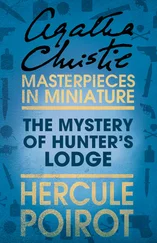Which he did; Eddie’s very first lorry. Until then, he had pulled his farming machinery or had delivered loads by tractor. The lorry was a second hand Guy, a four-wheeler Guy Invincible, which he bought for £475. Ideal for carrying and tipping basic loads of slag.
Eddie decided to have the lorry painted; make it look a bit brighter. The colours he chose were Post Office red (roughly the colour of the panels on his threshing machine, which he’d always liked) and Brunswick green. On the cab door, in small but discreet lettering, he had painted the words: ‘E.P. Stobart, Caldbeck 206, Cumberland’.
And so the first Eddie Stobart lorry hit the road. But, alas, not for long. The Guy turned out to be a bad buy, a load of trouble, always going wrong. Eddie sold it a few months later for £420, thus losing £55 on the deal.
Instead, he bought a new Ford Thames lorry, which cost the large sum of £1,450. He financed it through a hire-purchase agreement, putting down a deposit of £135. A big commitment, but he hoped the fertilizing business was going to be profitable in the years to come.
At the same time, Eddie and Nora decided to enlarge their bungalow. It was proving too small to hold their family of four young children plus trying to run a business from the same premises.
Then, out of the blue, Harrison Irvinson, the local agricultural merchant who had been providing work spreading slag, went out of business. Eddie was left with a full order book of slag to be delivered and spread, a lot of expensive equipment, including a new lorry, but no slag. You needed a licence to be an agricultural merchant, which was not easy to get, and Eddie didn’t have one. You also needed capital to set up as a merchant and buy stock.
Eddie had a few sleepless nights but eventually managed to do a deal with a Carlisle firm of agricultural merchants, Oliver and Snowden. But, as well as spreading the fertilizer, Eddie Stobart now also had to go and collect it. Most of it came from ICI or other steel plants in Middlesbrough, Scunthorpe or Corby, a residue of the smelting process. So Eddie had to acquire more lorries and drivers.
This led one day to a visit from an ICI official who said that Eddie’s premises at Hesket were right in the middle of an area where the company wanted to expand their supply of slag for agricultural purposes. ICI was lacking a suitable slag store, a dump, where slag could be kept till needed. It offered to pay Eddie to go and collect the slag, and promised regular work, but he would have to build the slag store himself, and a weighbridge, and get the appropriate planning consents – all at his own expense.
Eddie worked out that the total cost would come to some £8000. Where could he get such a sum? And if he could, would it be worth it? Eventually, with the help of Penrith accountant, N.T. O’Reilly, he managed to borrow the money and the slag store was built.
In this way, Eddie’s business as an agricultural contractor continued to expand during the 1960s. He took on more lorries and drivers and acquired more customers amongst the farming community. By 1969, he had three lorries, three tractors, three spreaders and a JCB. His turnover that year was £79,700, his profit £4687 and his wage bill £6992.
He even survived what could have been an extremely serious setback when the agricultural fertilizer department of ICI was taken over by Fisons, who then decided they didn’t need the use of Eddie’s slag store any more. They gave him a month’s notice, then pulled out of the agreement.
Once again, Eddie and Nora slept badly for a few weeks and did a lot of heavy praying. In the end, it led to them purchasing slag in their own right, rather than just collecting and distributing it for others.
During all these developments in the 1950s and 1960s, throughout the setbacks and excitements, Eddie and Nora remember doing a lot of praying. They continued to be devout Christians but were moving towards the more evangelical wing. Eddie was a lay preacher, and he and Nora became involved in the Cumbrian branch of the Gideon movement, helping to distribute Bibles to schools, hospitals and prisons. They both attended Christian meetings all over the county and were continually putting up visiting preachers at their home in Hesket.
Eddie never worked at all over the weekends, whatever the drama might be. Sunday was devoted to God; Saturdays to their young family. Business was not the most important thing in their life; it was just what they did during the week.
YOUNG EDWARD
The Stobart children were all very blonde when young, but then most native Cumbrian children are born fair-haired. You see them ‘up street’ in Carlisle on Saturday mornings, in from the country and shopping with their mums and dads, being dragged around, little boys and girls, so fresh-faced and fair, like little angels. It’s the Scandinavian in them coming out, leftovers from the Viking Norse raiders.
The Norse influence can also be seen in the rural place names: ‘beck’, meaning stream, ‘how’, meaning small hill, ‘pike’, for sharp summit, ‘thwaite’, meaning clearing. ‘Howbeck’, the name of the little village school in Hesket, is a perfect example, combining two Norse words. This was the school that all the young Stobarts attended, just as Eddie himself had done.
Young Edward, the Stobarts’ third child, started at Howbeck at five years old, and was taken there each day by his sister Anne, aged seven. They walked the one-and-a-half miles to get there, along with their six-year-old brother, John. Edward has no memory of his mother taking him to school; his memory of her during his childhood was that she was ill and very often in bed all day. ‘I don’t even remember her making my breakfast,’ he says now. During her thirties, Nora did have a sequence of illness, such as gallstone problems which confined her to her bed, but she was later to recover her health.
Edward has a clear memory of what he thought about his first day at Howbeck school: ‘I hated it. It was a nightmare from day one. I remember thinking: “How am I going to get through it, so that I can go home and play?”’
By playing, Edward meant watching his father’s machinery in the yard, tipping and loading, or going to his grandfather’s farm and playing with the animals there. His little job each day was to go to his grandfather’s to pick up a can of milk for their family.
Edward’s father had remained at Howbeck all his school life, such as it was, as in those days pupils could stay there until they were fourteen. By the time young Edward attended, Howbeck had become a primary school, which meant that, at eleven years old, you had to move on elsewhere. There were just two classes in the school: Class One, for those aged five to eight, and Class Two, for those aged eight to eleven. Edward reminisces: ‘I remember a Miss Allcorn taking Class One – and what I remember about her was that she had a bubble car. Miss Ashbridge took Class Two and she was the headmistress.’ Kathleen Ashbridge always retained pleasant memories of the Stobart boys. They were not great scholars, but she had no trouble from them.
‘If I was naughty at school,’ says Edward, ‘I did it behind the scenes. But I wasn’t a troublemaker. All I got told off for by Miss Ashbridge was for not doing well. She’d then put me in the corner with my face to the wall. I quite liked sums, that was about all. Nothing else. I spent a lot of time just sitting, drawing cars and lorries.’
According to Nora, Edward was always the most adventurous of her four children, and the one who usually got injured. ‘He had accidents all the time. One of the earliest was when he was rushing into Mrs Jardine’s field to feed her hens. He was in such a hurry that he ran straight into a barbed-wire fence. He cut his whole face; the blood was awful. But that was typical. He was always falling off things or stumbling over things.
Читать дальше












